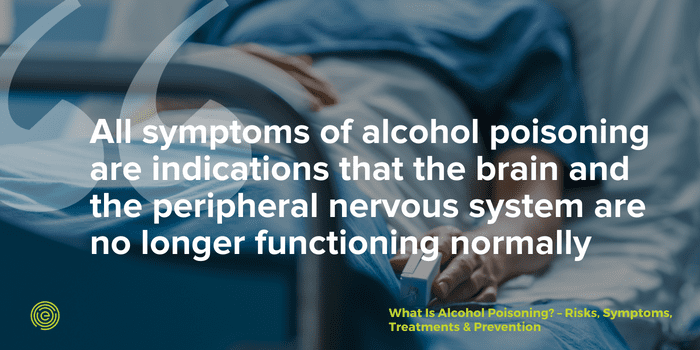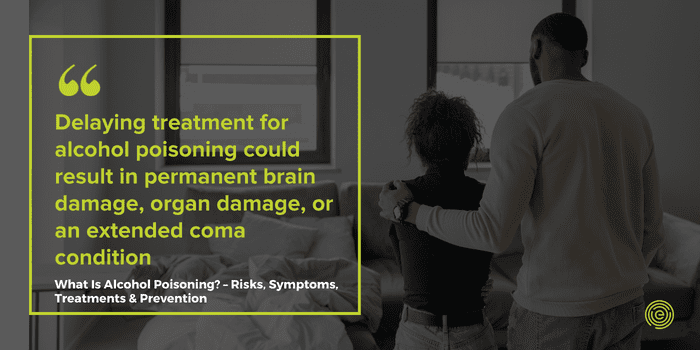After drinking seven beers and two shots of whiskey in about two hours, 17-year-old John began feeling incredibly nauseous and disoriented. His friends just laughed at John’s inability to stay awake or talk coherently. They propped him up on a couch and continued playing a drinking game.
A few minutes later, John started vomiting while unconscious. His friends laid him on his side on the couch so the vomit would run out of his mouth. They tried to wake up John by slapping his face and pouring a glass of cold water over his head but nothing worked. “Let him sleep it off,” Ray said. “He’ll have a terrible hangover in the morning”.
But John didn’t have a hangover. Instead, John died of alcohol poisoning that night while his friends continued playing cards.
Blood Alcohol Level (BAC) and Alcohol Poisoning
The Cleveland Clinic defines pre-alcohol poisoning as having a BAC of between 0.16 and 0.30 percent and alcohol poisoning as having a BAC of between 0.31 and 0.45 percent. If John’s friends had taken him to an emergency room when his BAC was at pre-alcoholism poisoning levels, he could have been treated and his life saved.
Why does alcohol poisoning cause death when blood alcohol levels reach a certain percentage? Doctors cite these four reasons:
- Soft tissues absorb and retain alcohol
Alcohol enters your bloodstream almost immediately after reaching the stomach. As alcohol-rich blood flows throughout the body, tissues readily absorb and hold alcohol for much longer than it takes for your body to eliminate food waste. Drinking a lot of alcohol in just a few hours doesn’t give your liver time enough to reduce your BAC and lower your risk of alcohol poisoning.
- Alcohol stresses liver functioning
The liver is primarily responsible for metabolizing alcohol and getting rid of it in the bloodstream. However, one drink takes the liver about an hour to metabolize. When you drink seven beers and two shots and whiskey in just a couple of hours, your liver cannot function normally. This means alcohol stays in the body for a dangerously long time.
- Alcohol is a nervous system depressant
Alcohol suppresses the ability of nerves to support life functions, such as heart contractions, swallowing, breathing, etc. When blood alcohol level reaches alcohol poisoning level, the central nervous system stops working and the result is unconsciousness and death.
- BAC continues rising even if you stop drinking
Even though John stopped drinking and passed out, his blood alcohol concentration continued rising as his liver struggled to eliminate alcohol toxins from his bloodstream. Unfortunately, too many alcohol poisoning deaths happen when everyone thinks the passed-out drinker is out of danger simply because they stopped drinking.
Teens and Alcohol Poisoning
Canada currently has a medium-high, 2.76 alcohol death rate compared to all other world countries. Many cases of alcohol poisoning involve binge-drinking scenarios like teenage John and his drinking buddies. Binge drinking is defined as drinking at least four to five drinks in less than two hours. One drink equals any of the following:
- 12-ounce beer
- Eight ounces of malt liquor
- Five ounces of wine (not wine coolers)
- Between one and two ounces of hard liquor (80 proof and higher)
What Does Alcohol Proof Mean?
Ethyl (grain) alcohol is essentially beer, wine, and other alcoholic beverages. The level of dilution of grain alcohol in alcoholic beverages is called the “proof” of that beverage. For example, whiskey that is labeled 80 proof means its ethyl alcohol content has been diluted by 20 percent. The higher the proof, the more alcoholic that beverage is.
Ethyl alcohol is a central nervous system depressant. Drinking one beer or one shot of whiskey will negatively impact your breathing, heart rate, speech, movements, and visual/auditory perceptions. The pre-alcohol poisoning stage is characterized by the following signs:
- Inability to sense pain, cold, or heat (this is why doctors warn against drinking alcohol outside when the temperature is extremely hot or below freezing)
- Vomiting/rapid onset of dehydration
- Inability to make rational decisions/loss of judgmental capacity
- Slurring speech
- Difficulty walking a straight line
- Dizziness/disorientation
- Extreme sedation
- Slowed breathing
Effects of Alcohol Poisoning on the Brain
A neurotoxin is any substance that disrupts the functioning of brain cells called neurons. Illegal drugs like heroin and methamphetamine are neurotoxins. Arsenic, ammonia, and lead are neurotoxins. Alcohol is also a neurotoxin.
Although alcohol does not kill neurons, research shows that alcohol damages dendrites and dendritic branches carrying signals from one neuron to another. When neurons can’t communicate properly, the brain and nervous system start shutting down. Moreover, imaging scans of long-term alcoholics reveal shrunken brain cells and atrophied areas of the brain due to neuron damage.

Since the brain is the “hub” of the central nervous system, alcohol poisoning suppresses brain activity enough to cause death. All symptoms of alcohol poisoning are indications that the brain and the peripheral nervous system are no longer functioning normally:
- Reduced respiratory rate (less than nine breaths per minute)
- Pale or bluish skin and lips
- Muscle tremors
- Seizures
- Vomiting while unconscious and remaining unconscious
- Hypothermia (abnormally low body temperature
- Inability to be roused out of a sleep state
Emergency treatment of poisoning is comparable to treating overdoses involving different types of alcohol – mostly supportive with intubation and IV drips administered for the first 24 to 48 hours.
Is Alcohol a Stimulant or a Depressant?
Alcohol as a Stimulant
Although alcohol stimulates mood, it is clinically considered a depressant. Alcohol causes dopamine levels to increase in the brain, causing drinkers to feel animated, euphoric, and uninhibited. Alcohol activates dopamine release within the brain’s reward system and increases the metabolism of glucose (blood sugar). This also contributes to drinkers feeling “happy” after consuming several alcoholic beverages.
Alcohol as a Sedative
Certain brain regions play important roles in alcohol’s ability to depress the central nervous system. PET scans indicate that drinking large amounts of alcohol interferes with the metabolism of brain glucose, which suppresses brain activity. Other studies show that alcohol impairs amygdala functioning and the ability of drinkers to distinguish non-threatening situations from threatening situations. This could explain why alcohol reduces anxiety, increases impulsivity, and diminishes motor coordination.
Symptoms of a Hangover
A hangover is a constellation of symptoms affecting people who go to sleep after getting drunk. Upon awakening, a person with a hangover will have a terrible headache, dry mouth, nausea, fatigue, and dizziness. Taking ibuprofen and drinking fluids to restore the body’s electrolyte balance can help individuals with hangovers get through the day.
The main difference between alcohol poisoning and a hangover is that a hangover isn’t life-threatening. Someone waking up with a hangover did not drink seven or eight alcoholic beverages in just two hours. Instead, they likely nursed three or four drinks over an entire evening.
Mild signs of possible alcohol poisoning include:
- Clammy skin
- Difficulty staying awake
- Semi-coherent
- Vomiting while conscious
- Dizziness/falling down
Acute signs of alcohol poisoning include:
- Disorientation/confusion/hallucinations
- Slow or shallow breathing
- Breathing irregularities such as a cyclical pause in breathing followed by normal breathing
- Lowered body temperature or loss of warmth, known as hypothermia
- Increased heart rate
- Drop in blood pressure
- Vomiting continuously/choking on vomit
- Seizures
- Pale skin/blue lips/blue fingertips
- Falling unconscious and not waking up
At this point, the person will likely fall into a coma and die if they are not treated as soon as possible.
What To Do In Case of Alcohol Poisoning
When someone is showing signs of alcohol poisoning, never give them coffee to drink or force them into a cold shower. They have been seriously poisoned and need professional assistance.
Emergency procedures for stabilizing someone with alcohol poisoning include:
- Treating low blood sugar with a saline flush and dextrose solution.
- Administering thiamine to prevent seizures.
- Applying hemodialysis if blood alcohol concentration is >400 mg/dL and/or if metabolic acidosis exists. Hemodialysis machines filter salts and wastes from the blood when the kidneys are not functioning normally.
- Providing oxygen therapy to help reverse respiratory distress.
- Administration of medications to treat nausea, anxiety, and tremor after the patient is awake and out of danger.

Recovering from alcohol poisoning typically takes between 24 and 48 hours if the person receives supportive care ASAP. Delaying treatment for alcohol poisoning could result in permanent brain damage, organ damage, or an extended coma condition.
Alcohol use disorder (AUD) is the newer term for alcoholism. People with AUD answer “yes” to at least two of these questions:
- Do you often drink more than what you originally intended to drink?
- Have you tried to stop or cut back on drinking but couldn’t due to withdrawal symptoms and cravings for alcohol?
- Do you think about drinking frequently?
- Has drinking interfered with your family responsibilities, job performance, and relationships?
- Have you ever been arrested for drunk driving?
- Do you have to drink more than you previously drank just to feel intoxicated?
- Has a family member suggested you should stop drinking so much?
- Do you have health problems due to drinking?
AUD significantly increases the risk of alcohol poisoning. Tolerance builds quickly for the intoxicating effects of alcohol, resulting in the need for people with AUD to drink more just to feel drunk. However, having a high tolerance for alcohol does not mean you can hold more alcohol without risking alcohol poisoning.
The best way to prevent alcohol poisoning is not to drink. However, since that isn’t a practical suggestion, here are simple methods for avoiding alcohol poisoning if you do drink:
- Don’t drink on an empty stomach. Food slows down the ability of the intestines to absorb alcohol before it reaches the bloodstream.
- Limit yourself to one mixed drink or two beers every two hours.
- Stay hydrated by drinking water after having an alcoholic beverage
- Don’t play drinking games
- NEVER mix alcohol with any type of medication
Is It Safe to Mix Energy Drinks with Alcohol?
No. Energy drinks contain chemicals that stimulate the central nervous system while counteracting the depressant effects of alcohol. In other words, people who mix alcohol and energy drinks won’t feel drunk as fast as they would have by drinking just alcohol. They may consume four or more drinks in one or two hours since they don’t feel “drunk” and quickly show signs of alcohol poisoning.
Stimulants Increase Alcohol Consumption
Diet pills, Adderall, methamphetamine, and other stimulants also suppress the sedative effects of alcohol. Combining stimulants with alcohol means you can drink more alcohol without feeling drowsy or passing out. In fact, many cases of alcohol poisoning involve teens combining energy drinks or stimulants with alcohol.
Treatment and Recovery from Alcohol Poisoning
You can’t treat alcohol poisoning at home. No amount of cold showers, walking back and forth, or getting the person to eat something will reverse the potentially fatal effects of alcohol poisoning. In addition, alcohol poisoning may have caused serious damage to the liver and kidneys that requires the expertise of emergency room doctors. Call our helpline today at 416-644-6345 or fill out our admission form.




